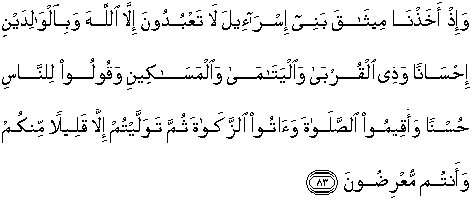Quran, the holy book
Quran, the holy book of Islam has been a source of guidance and inspiration for people. The teachings helped shape Islamic civilization and continue to influence the lives of millions around the world, but the Quran’s message is not just for Muslims. It contains timeless wisdom and guidance that benefit all of mankind.
One of the central themes of the Quran is to create a better world full of justice, mercy, and peace. It also calls on its followers to engage in positive change and become agents of change in their communities and throughout the world.
In this article, discover the 10 Ayats from the Quran that will help bring about positive change and make the world a better place.
“O you who believe, be upholders of justice – witnesses for Allah, even though against yourselves or the parents and kinsmen.”
This verse is from the Quran, more specifically Surah Annisa (4:135). It is a call to all believers to uphold justice and bear witness to Allah, even if it means going against their own interests or those of their parents or loved ones. It emphasises the importance of fairness and justice and emphasises that loyalty and submission to Allah must take precedence over personal and family interests.
It also suggests that believers have a responsibility to speak up and defend justice, even if it means taking action against those closest to them. In general, this verse encourages people to act with integrity and to build a just and equal society in accordance with Islamic teachings.

“There is no compulsion in religion.”
The verse you mentioned is Surah Al-Baqarah (2:256), and the Quran states: “There is no compulsion in religion. The right course has become clear from the wrong. So whoever disbelieves in Taghut and believes in Allah has grasped the most trustworthy handhold with no break in it. Allah is Hearing and Knowing.”
Those who believe in Allah and do not believe in false gods, and they have the surest grip that can never be broken. This verse is often cited as evidence of Islam’s commitment to tolerance and religious freedom. This verse also emphasizes the importance of rejecting false gods and promising faith in Allah.
Overall, this verse promotes a message of freedom, choice, and personal responsibility in matters of faith. It is a reminder that true faith comes from within and is not forced upon us by outside forces.

“Everyone is allowed whether to believe or to deny: “Now whoever so wills may believe and whoever so wills may deny.”
The 29th Quranic passage of Sura Al-Kahf emphasizes the principle of free will in matters of faith. It states that truth comes from Allah and that people are free to believe or not. We also recognize that everyone is free to make their own choices and that no one is forced to believe their will.
It acknowledges that others may choose to deny it, and that is their individual choice This principle of free will is a fundamental aspect of Islam and emphasizes the importance of individual responsibility and accountability in matters of faith.

“When I have fashioned him (in due proportion) and breathed into him of My spirit, fall ye down in obeisance unto him.”
This is a verse from the Quran, specifically from Surah Al-Hijr, verse 29. This verse describes the creation of Adam, the first human being. It emphasizes the divine origin and purpose of human creation, and Allah created Adam in proportion to it and filled him with his own Spirit. This verse also emphasizes the importance of obedience to the commandments of Allah.
The phrase “bow before Him” calls upon Allah to bow and show humility, acknowledging his authority and superiority over all creation. It is also a reminder that we should strive to achieve our earthly purpose by living according to our will and guidance.

“O mankind, we have created you from a male and a female, and made you into races and tribes, so that you may identify one another. Surely the noblest of you, in Allah’s sight, is the one who is most pious of you. Surely Allah is All-Knowing, All-Aware.”
This is a verse from the Quran, specifically from Surah Al-Hujurat, verse 13. This verse emphasizes the equality of all human beings regardless of race, ethnicity, or tribal affiliations. It reminds us that we all have a common origin and that our differences are meant to help us recognize and appreciate each other’s unique qualities and abilities.
The verse also emphasizes the importance of righteousness, which are the qualities that truly matter in the sight of Allah, rather than external factors such as wealth, social status, or race.

“O you who have believed, do not consume one another’s wealth unjustly but only [in lawful] business by mutual consent. And do not kill yourselves [or one another]. Indeed, Allah is to you ever Merciful”
The verse mentioned is the 29th verse of the Quran, Surah An-Nisa. It emphasizes the sanctity of life and the importance of avoiding actions that may harm ourselves and others. This verse expressly forbids killing oneself or others, emphasizing the seriousness of such acts and the importance of valuing human life.
This verse encourages individuals to take care of their physical and mental health and avoid behavior that can lead to harm or destruction. It emphasizes importance and reminds us that Allah is always merciful and forgiving. By promoting the sanctity of life and emphasizing the importance of compassion and mercy, this verse helps us create a better world by fostering a culture of compassion and concern for ourselves and others.
We encourage individuals to prioritize their physical and mental health and to act with compassion and kindness toward others. It also serves as a reminder to value human life and avoid actions that lead to harm or destruction. Ultimately, this message of compassion and mercy will help create a world filled with compassion and kindness, respecting the dignity of all human beings.

“And say: My Lord, increase me in knowledge.”
Surah Ta-Ha, Verse 114 is a beautiful supplication made by Prophet Musa to Allah, asking for an increase in knowledge. This verse highlights the importance of seeking knowledge and the role of Allah in providing it. It also emphasizes that knowledge is not something that can be obtained solely through human effort, but it is ultimately a gift from Allah.
Seeking knowledge should be a continuous process, and we should always strive to learn new things and improve our understanding of the world around us. It is a beautiful reminder for all believers to seek knowledge and to pray for its increase.
The pursuit of knowledge is highly valued in Islam, and it is considered a means of getting closer to Allah and fulfilling one’s purpose in life.

“And speak to people good [words] and establish prayer and give zakah (charity). Then, when you leave, be steadfast upon prayer and be consistent in giving charity, and obey Allah and His Messenger. And Allah is aware of what you do.”
This verse mentioned is Surah Al-Baqarah, Verse 83 of the Quran. It emphasizes the importance of good deeds and treating others with kindness and respect. This verse encourages individuals to engage in acts of worship, such as prayer and giving charity, as a means of seeking Allah’s blessings and guidance.
By promoting the values of kindness, respect, and good deeds, this verse can help create a better world by fostering a culture of compassion and generosity. It encourages individuals to prioritize acts of worship and to seek Allah’s guidance and blessings in all aspects of their lives.
Additionally, it reminds us to be mindful of the impact of our words and actions on others, and to speak to them in a way that is kind, respectful, and beneficial.

“And the retribution for an evil act is an evil one like it, but whoever pardons and makes reconciliation, his reward is [due] from Allah. Indeed, He does not like wrongdoers.”
The verse mentioned is Surah Ash-Shura, Verse 40 of the Quran. It emphasizes the importance of forgiveness, reconciliation, and avoiding harmful behavior. This verse encourages individuals to avoid harmful behavior and to seek forgiveness and reconciliation when harm has been done.
It emphasizes the principle of reciprocity, which suggests that the punishment for harmful behavior should be proportional to the harm that was caused. By promoting the values of forgiveness, reconciliation, and non-violence, this verse can help create a better world by fostering a culture of peace and understanding. It encourages individuals to avoid harmful behavior and to seek forgiveness and reconciliation when harm has been done, rather than seeking revenge or retribution.
Additionally, it reminds us to be mindful of the impact of our actions on others, and to prioritize the well-being of those around us.
﴿وَجَزَاءُ سَيِّئَةٍ سَيِّئَةٌ مِّثْلُهَا ۖ فَمَنْ عَفَا وَأَصْلَحَ فَأَجْرُهُ عَلَى اللَّهِ ۚ إِنَّهُ لَا يُحِبُّ الظَّالِمِينَ﴾
“And the servants of the Most Merciful are those who walk upon the earth easily, and when the ignorant address them [harshly], they say [words of] peace.”
This verse mentioned is of the Quran. It highlights the importance of maintaining a peaceful and respectful demeanor when faced with ignorance and hostility. It encourages individuals to maintain a peaceful and respectful demeanor in all interactions, regardless of the behavior of others. It emphasizes the importance of treating others with kindness and respect, even when faced with hostility.
This verse can help create a better world by fostering a culture of compassion and understanding. It encourages individuals to prioritize kindness and respect in all interactions, and to avoid responding to ignorance or hostility with more of the same. Additionally, it reminds us to be mindful of the impact of our words and actions on others, and to prioritize the well-being of those around us.




